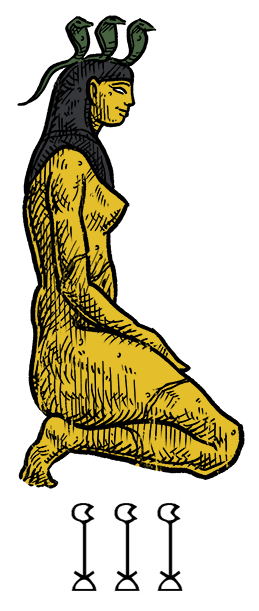Khau
Khau is the 30th decan of the main decanal stars of Egyptian astrology. The decan has its heliacal rise during the week of II Shemu 21-30 in the Egyptian calendar. Its name is translated as "the thousands."
Name
“The Thousands” may seem like a strange name for a decan, but it represents someone who has received respect and admiration from a large group of people. It may help to know that the astronomical identity of this decan is most likely the Pleiades, a cluster of just over 1,000 stars. Only about 14 of these stars can be seen by the naked eye, but the ancient Egyptians gave this decan a name which turned out to be incredibly accurate.
Divination meaning
The Egyptian Star Oracle connects this decan with either possessiveness or sharing. The children created by the Potter represent all of humanity. Human beings, especially when they are very young, tend to be selfish, but can also display altruistic acts of kindness by sharing what they have.
Characteristics
Khau is attested in at least three ancient texts as a god that provides oracles. Berlin Papyrus 8525, 8526, and 23303, written around 975BC, are all addressed to Horus-Khau, with a request for help in returning a lost maidservant and assistance judging a dispute over a debt to be settled with a weaver.
In ritual work, according to the Naos of the Decades, this decan is tasked with creating fear and respect in the hearts of all foreign leaders while also defeating those who oppose order. This is affirmed by Coffin Text Spell 768, wherein the deceased pleads to be recognized by the Universe: “O, You who see all! O, You who work the destruction of all! Tell the tens, hundreds, Thousands, tens of thousands, Hundreds of thousands, millions, and all the universe about me. If I be aware, do not be unaware of me. If you know me, I will know you.”
The Dendera B zodiac ceiling depicts this decan as a nude woman in a kneeling position with four snakes upon her head. Its minerals are listed as carnelian and gold.
Testament of Solomon
A grimoire called Testament of Solomon may include a description of Khau. The demon Obizuth is summoned by King Solomon and appears as a woman with no arms and disheveled hair. This decan is depicted on the Dendera B zodiac as a kneeling woman with her hands beside her. When viewed from the ground, it may have appeared as though she had no limbs. The image of Khau shows her long hair with three moving snakes on top of her head, also gives it a wild and disheveled appearance.
In this form, Khau is embodying the goddess Wadjet, who, as the protector of young Horus, was revered as the protector of women in childbirth. In the Testament of Solomon, the demon Obizuth is said to have a glance that was “altogether bright and greeny, and her hair was tossed wildly like a dragon's.” The goddess Wadjet's name, in Egyptian, means “the Green One.” Making this decan a highly probable match for this demon as well as the Akhuy decan.
Khau also shares some characteristics with Lilith and may be her Egyptian incarnation.
| The Decans of Egyptian Astrology | ||
|---|---|---|
| Previous Decan | This Decan | Next Decan |
| Sawy Qed | Khau | Aryt |
